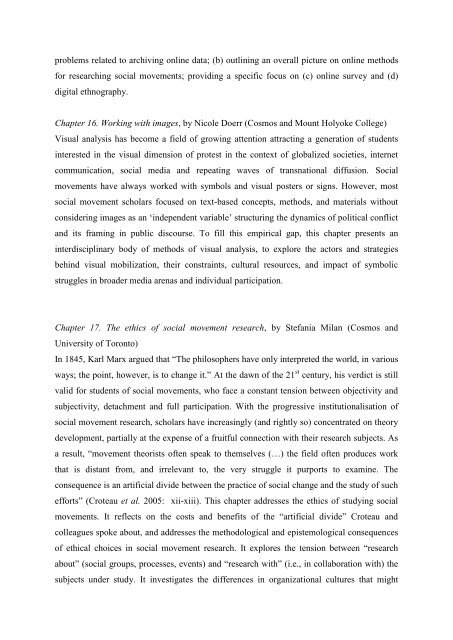Methodological Practices in Social Movements Research
Methodological Practices in Social Movements Research
Methodological Practices in Social Movements Research
Create successful ePaper yourself
Turn your PDF publications into a flip-book with our unique Google optimized e-Paper software.
problems related to archiv<strong>in</strong>g onl<strong>in</strong>e data; (b) outl<strong>in</strong><strong>in</strong>g an overall picture on onl<strong>in</strong>e methods<br />
for research<strong>in</strong>g social movements; provid<strong>in</strong>g a specific focus on (c) onl<strong>in</strong>e survey and (d)<br />
digital ethnography.<br />
Chapter 16. Work<strong>in</strong>g with images, by Nicole Doerr (Cosmos and Mount Holyoke College)<br />
Visual analysis has become a field of grow<strong>in</strong>g attention attract<strong>in</strong>g a generation of students<br />
<strong>in</strong>terested <strong>in</strong> the visual dimension of protest <strong>in</strong> the context of globalized societies, <strong>in</strong>ternet<br />
communication, social media and repeat<strong>in</strong>g waves of transnational diffusion. <strong>Social</strong><br />
movements have always worked with symbols and visual posters or signs. However, most<br />
social movement scholars focused on text-based concepts, methods, and materials without<br />
consider<strong>in</strong>g images as an ‘<strong>in</strong>dependent variable’ structur<strong>in</strong>g the dynamics of political conflict<br />
and its fram<strong>in</strong>g <strong>in</strong> public discourse. To fill this empirical gap, this chapter presents an<br />
<strong>in</strong>terdiscipl<strong>in</strong>ary body of methods of visual analysis, to explore the actors and strategies<br />
beh<strong>in</strong>d visual mobilization, their constra<strong>in</strong>ts, cultural resources, and impact of symbolic<br />
struggles <strong>in</strong> broader media arenas and <strong>in</strong>dividual participation.<br />
Chapter 17. The ethics of social movement research, by Stefania Milan (Cosmos and<br />
University of Toronto)<br />
In 1845, Karl Marx argued that “The philosophers have only <strong>in</strong>terpreted the world, <strong>in</strong> various<br />
ways; the po<strong>in</strong>t, however, is to change it.” At the dawn of the 21 st century, his verdict is still<br />
valid for students of social movements, who face a constant tension between objectivity and<br />
subjectivity, detachment and full participation. With the progressive <strong>in</strong>stitutionalisation of<br />
social movement research, scholars have <strong>in</strong>creas<strong>in</strong>gly (and rightly so) concentrated on theory<br />
development, partially at the expense of a fruitful connection with their research subjects. As<br />
a result, “movement theorists often speak to themselves (…) the field often produces work<br />
that is distant from, and irrelevant to, the very struggle it purports to exam<strong>in</strong>e. The<br />
consequence is an artificial divide between the practice of social change and the study of such<br />
efforts” (Croteau et al. 2005: xii-xiii). This chapter addresses the ethics of study<strong>in</strong>g social<br />
movements. It reflects on the costs and benefits of the “artificial divide” Croteau and<br />
colleagues spoke about, and addresses the methodological and epistemological consequences<br />
of ethical choices <strong>in</strong> social movement research. It explores the tension between “research<br />
about” (social groups, processes, events) and “research with” (i.e., <strong>in</strong> collaboration with) the<br />
subjects under study. It <strong>in</strong>vestigates the differences <strong>in</strong> organizational cultures that might

















